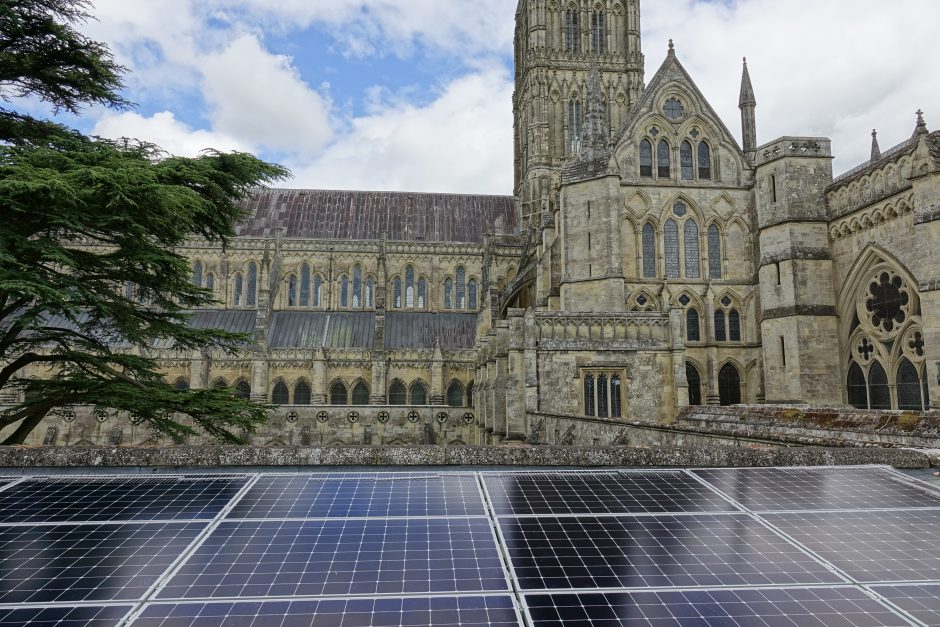Mike Smyth has been chair of Energy4All, a family of 30 independent renewable energy co-ops, since 2014. He also chairs the Schools’ Energy Co-operative and the Wey Valley Solar Schools Energy Co-operative. Previously, he was chair of Friends of the Earth Trust from 2002-2012, following a career in law.
How did you get involved with Energy4All and community energy?
I had been very concerned about environmental issues and climate change for decades and was chair of the Friends of the Earth Trust until 2012. I saw an advert for Baywind, the first of the community energy organisations, some 20 years ago, thought it was brilliant, and joined them. When I retired from my legal practice in 2004, to spend more time on environmental activities, I went along to a meeting of Energy4All and I could see it needed help with restructuring. I was impressed by the quality of Energy4All’s representatives and volunteered to help in about 2005. I got the community energy bug and now I’m a full-time volunteer. I’m a solicitor by background and it’s good to use those skills for something I care about. I joined the Energy4All board soon after I started volunteering, and was later asked to chair the organisation.
What are some notable achievements of Energy4All?
One of them is High Winds – the successor to Baywind, installed on the Harlock Hill site in Cumbria when the Baywind turbines were decommissioned. The new installation is twice as powerful; Energy4All worked with the co-op’s members to acquire the neighbouring Mean Moor windfarm, giving it a total of five turbines.
Another is the Schools Energy Co-op, which focuses on putting solar panels on schools and other public buildings. We put solar on the roof of the cloister at Salisbury Cathedral – being trusted with such iconic and important building was a great honour. When the sun’s out, it will power the cathedral, the gift shop, the cafe, and the offices.

Energy4All also worked with M&S to set up a business installing solar panels on some of its stores – which allowed us to use its brand, as the M&S Energy Society. To work with a big company like this was a great feather in our cap.
I’d also like to mention Springbok, which supplies wood-fuelled district heating in a hamlet on the Surrey / Sussex borders. We replaced 20 oil boilers with wood from adjacent woodland. It’s a site run by the Care Ashore charity which gives accommodation and respite care for retired mariners. It allowed the adjacent woodlands to come back into management, which is beneficial for wildlife, so it’s a great mixture of energy and nature. There’s been a huge increase in the number of butterflies; before the project, there was just one species of butterfly and that’s now up to 26, with the wood white, a very rare species, now breeding.

What lessons are there from the UK’s looming gas energy crisis?
This is wholly self-inflicted. If you’re not going to have gas storage, prohibit wind farms in England, stop Feed-in Tariffs for solar, haven’t given any offshore wind projects the go-ahead for a decade and you withdraw from the EU energy market, you shouldn’t wonder why you’ve created an energy crisis. The policy was designed to cause one.
To a limited extent, it raises the profile of community energy, as does COP26 and the worrying climate science which shows we have delayed far too long in tackling the issue. But the government has also ended all principal energy efficiency measures, so so we use more gas, and they have no policy on heat. Whether it’s an opportunity for us is difficult to say – if prices stay high then it means the market conditions for renewable energy improve and that will help. The price of energy being capped below cost makes it hard to see how it will shake out. But we need policy change.
Does the community energy model deliver benefits when it comes to adopting new energy tech?
Potentially so. By and large, community energy is not at the forefront of tech innovation and I don’t think that’s its remit, it’s more focused on delivery.
But the sector is a trusted intermediary – in a way that neither the commercial or public sectors are trusted. This can be important as we try to decarbonise heat. In northern Europe they’re ahead of Britain and the community model is more successful. In the UK, the monopolies in utilities mean the customer is exploited and it becomes a game between the monopoly and regulator; and the regulator tends to lose. It also tends to prevent necessary capital investment. On the other hand, the municipal approach can get captured by staff interests.
What regulatory changes would you like to see?
It would be good to have the ability to export electricity and be paid for it – but the regulations are a mess. If you have solar on a school it’s hard to be paid for any electricity exported to the grid, it’s swallowed by the industry for free. Ofgem could sort it in a few weeks if they had the will. It would make a big difference – we could use roofs to generate electricity more cost-effectively, and when making installations we could fill a roof rather than being constrained. A lot of waste and unnecessary carbon is caused by sloppy regulation on export to the grid.
If you look at Europe and Scotland, government policy is more supportive of community energy. if you build a big new generator, the requirement is that a portion is community-owned. It would make a big difference if you could replicate that in England; we had it a few years ago and it worked very well. If a commercial 5mW project was installed you’d also have a 5mW community project alongside it; in Scotland, you get a community turbine alongside a wind farm. This helps to engage local people, retain wealth and compensates people with a share of new infrastructure they might not otherwise benefit from.
What new areas should Energy4All and the community energy sector develop?
It’s crucial that we do something about heat – but the government is preventing action. Gas is untaxed while electricity is heavily taxed, even though half the electricity we use is renewable. The basic delivery of electrical heat is five times gas, even through a super-efficient heat pump. It’s back to front; you either need revenue support or you need to bring in a carbon pricing system. You have to tackle heat and our model is ideal. But at the same time, you need to tackle the issues around insulation.